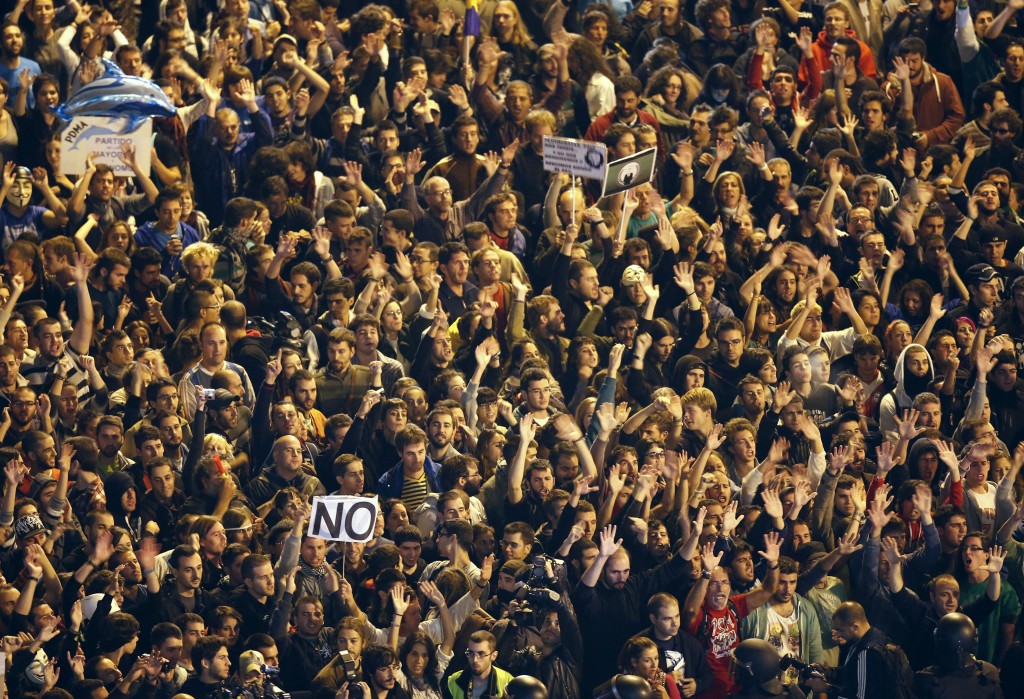 |
| Spanish protesters in Madrid, September 25, 2012 (taken from https://publicintelligence.net/madrid-athens-protest-photos-sep-2012/) |
And the same things go with other human rights movements. We've all seen the argument that #AllLivesMatter. Yep, it's true; they do matter. But you do not solve issues by ignoring the central problem. Black lives matter is focused on the issue that black lives are being devalued. By arguing against the movement saying that it is too focused on one race and needs to be generalized to everyone, you are essentially continuing to devalue the same lives that need to be fought for. Claiming that black lives matter does not decrease the value of other lives, it merely focuses on the issue that black lives need to be more valued than they currently are.
And this is the same with feminism. Yes, the word feminism is gendered. It should be. By saying, human rights or gender equality, you are targeting the same issues but you are taking the focus away from the oppressed to make yourself feel better. The argument that you agree with equality but aren't a feminist is invalid. The spread of #AllLivesMatter is not really progressive at all.
I understand that as a man, the term feminism must be intimidating. You are used to the position of power and privilege that comes from being male. (Note there are other circumstances, i.e. race, sexuality, SES that can cause privilege to fluctuate, but we cannot ignore the inherent privilege that comes with being a man). It's something we have all become used to, women included, so threatening that status quo can be unnerving. But it must be challenged.
[I'd also like to take a moment to say that privilege is not an inherently bad thing. The word privilege has become synonymous with ignorance and discrimination in the social justice community. It's often assumed that the more privilege an individual has, the less they can understand or be beneficial for social justice movements. However, privilege is not a dark mark on individuals with social power, but a useful resource in the fight for equality.]
Okay now back to my point. I think the issue most people have with social movements is that they find flaws in them and therefore justify not fighting for them. But nothing is perfect, and that includes social justice. Sometimes we do the wrong things. Sometimes we fight for the wrong causes. The thing about social justice is that you need to find what you believe in and fight for that. And maybe it doesn't fall perfectly under what you think the umbrella is of feminism or civil rights or LGBT rights. Maybe you think the movements are flawed. But that doesn't mean you sit on the sideline. That doesn't mean you get to say "I believe in equality, but I'm not a feminist." That doesn't mean you get to pick and choose aspects of a movement.
It means that you dive head first into whatever cause you are fighting. You make your voice heard. You fight for truth and you point out when you think the movement might be headed in the wrong way. Advocate for change; fight for a better future. Don't disqualify yourself based on the perceived missteps or shortcomings of others. We can't solve anything when we aren't united. And you're gonna have to unite yourself with a flawed cause, but that's the only way to fix anything.
[I'd also like to take a moment to say that privilege is not an inherently bad thing. The word privilege has become synonymous with ignorance and discrimination in the social justice community. It's often assumed that the more privilege an individual has, the less they can understand or be beneficial for social justice movements. However, privilege is not a dark mark on individuals with social power, but a useful resource in the fight for equality.]
Okay now back to my point. I think the issue most people have with social movements is that they find flaws in them and therefore justify not fighting for them. But nothing is perfect, and that includes social justice. Sometimes we do the wrong things. Sometimes we fight for the wrong causes. The thing about social justice is that you need to find what you believe in and fight for that. And maybe it doesn't fall perfectly under what you think the umbrella is of feminism or civil rights or LGBT rights. Maybe you think the movements are flawed. But that doesn't mean you sit on the sideline. That doesn't mean you get to say "I believe in equality, but I'm not a feminist." That doesn't mean you get to pick and choose aspects of a movement.
It means that you dive head first into whatever cause you are fighting. You make your voice heard. You fight for truth and you point out when you think the movement might be headed in the wrong way. Advocate for change; fight for a better future. Don't disqualify yourself based on the perceived missteps or shortcomings of others. We can't solve anything when we aren't united. And you're gonna have to unite yourself with a flawed cause, but that's the only way to fix anything.
